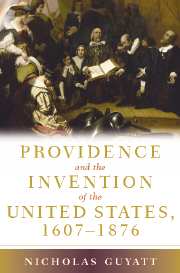Crossref Citations
This Book has been
cited by the following publications. This list is generated based on data provided by Crossref.
Johnson, Ann
2009.
Material Experiments: Environment and Engineering Institutions in the Early American Republic.
Osiris,
Vol. 24,
Issue. 1,
p.
53.
Raffe, Alasdair
2010.
Nature’s Scourges: The Natural World and Special Prayers, Fasts and Thanksgivings, 1541–1866.
Studies in Church History,
Vol. 46,
Issue. ,
p.
237.
Holsti, K. J.
2011.
Exceptionalism in American foreign policy: Is it exceptional?.
European Journal of International Relations,
Vol. 17,
Issue. 3,
p.
381.
Murphy, Andrew R.
2011.
The Blackwell Companion to Religion and Violence.
p.
524.
2012.
A Companion to Benjamin Franklin.
p.
499.
Eaton, Joseph
2012.
The Anglo-American Paper War.
p.
52.
Hopkins, Thomas
2013.
The Political Economy of Empire in the Early Modern World.
p.
53.
STEELE, BRIAN
2013.
Inventing Un-America.
Journal of American Studies,
Vol. 47,
Issue. 4,
p.
881.
Durbin, Sean
2013.
‘I am an Israeli’: Christian Zionism as American redemption.
Culture and Religion,
Vol. 14,
Issue. 3,
p.
324.
Kennedy, Catriona
2013.
Narratives of the Revolutionary and Napoleonic Wars.
p.
160.
Hickman, Jared
2014.
The Book of Mormonas Amerindian Apocalypse.
American Literature,
Vol. 86,
Issue. 3,
p.
429.
2015.
Women Prophets and Radical Protestantism in the British Atlantic World, 1640–1730.
p.
17.
Carson, James
2015.
The Columbian Covenant.
p.
1.
Carson, James
2015.
The Columbian Covenant.
p.
25.
Holsti, Kalevi
2016.
Kalevi Holsti: A Pioneer in International Relations Theory, Foreign Policy Analysis, History of International Order, and Security Studies.
Vol. 41,
Issue. ,
p.
121.
Hardwick, Joseph
2017.
Special Days of Worship and National Religion in the Australian Colonies, 1790–c. 1914.
The Journal of Imperial and Commonwealth History,
Vol. 45,
Issue. 3,
p.
365.
Johnson, Amanda Louise
2017.
Thomas Jefferson’s Anglo-Saxon Genesis: A Romance.
Modern Philology,
Vol. 114,
Issue. 3,
p.
680.
Fergusson, David
2018.
The Providence of God.
Britt Arredondo, Christopher
2018.
Enlightenment in an Age of Destruction.
p.
27.
Hardwick, Joseph
and
Williamson, Philip
2018.
Special Worship in the British Empire: From the Seventeenth to the Twentieth Centuries.
Studies in Church History,
Vol. 54,
Issue. ,
p.
260.





